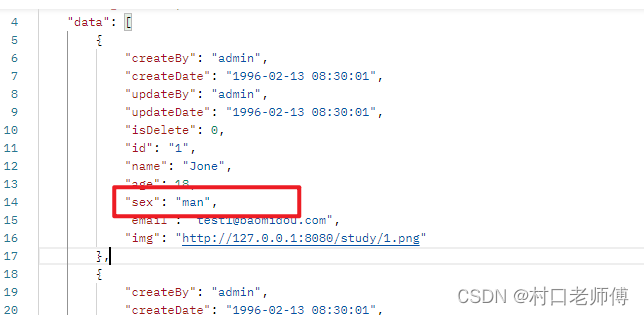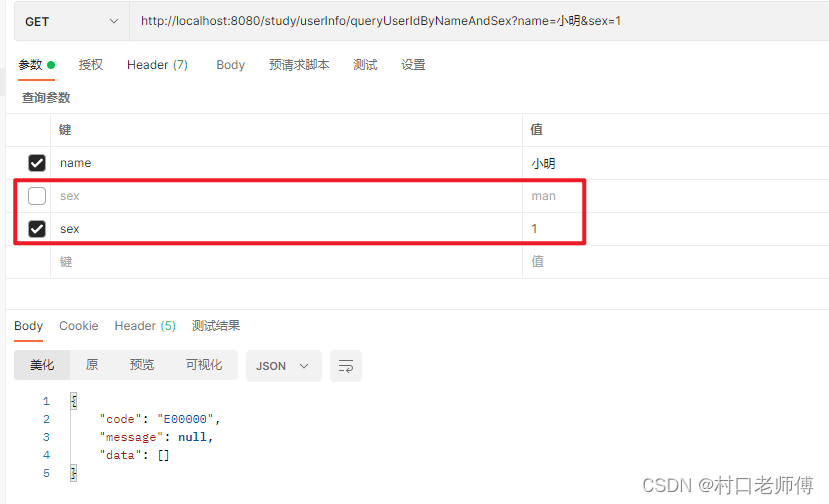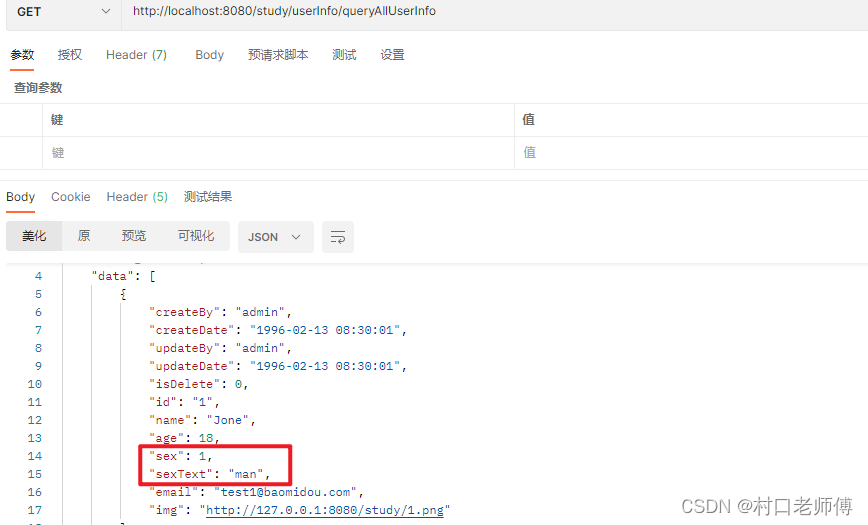SpringBoot 接口对数据枚举类型的入参以及出参转换处理
发布时间:2023年12月29日
1、在项目中使用枚举类型
一般我们在项目中,设置表的类型字段,都是用int存储,用0、1、2…代表不同类型的含义。
以性别字段为例:
数据库表字段设计为integer:
CREATE TABLE t_user_info
(
...
sex INT NOT NULL COMMENT '性别,0-女,1-男'
...
);
实体成员变量设计为枚举:
public class UserInfoEntity extends BaseField {
...
/** 性别,0-女,1-男 */
private Sex sex;
...
}
@Getter
public enum Sex implements BaseEnum {
woman(0, "女"), man(1, "男");
@EnumValue //标记数据库存的值是sex
private Integer code;
private String desc;
Sex(int code, String desc) {
this.code = code;
this.desc = desc;
}
public String getStrCode() {
return code.toString();
}
}
2、不做任何处理的演示效果
如果我们不做任何额外处理,当使用Sex枚举作为出入参时。只能返回man或woman或用man或woman作为参数。
2.1、接口出参
封装出参实体中sex成员变量类型为Sex枚举,则出参为:man或woman

2.2、接口入参
若是使用Sex枚举类型接收请求参数,不论是从接口get请求url中获取,还是使用构造实体接收post请求参数。都只能用man或woman作为参数,如果使用0或1作为参数,则无法正确被转换为Sex枚举。但是在开发过程中前端下拉选选项一般都与0,1,2…相对应。


3、用枚举的code作为参数和返回值
以上面的Sex枚举为例子,我希望在返回sex字段时,用0和1作为返回值,并且希望能用0和1映射男和女作为接口入参。该如何实现呢?
3.1 代码案例
3.1.1、定义枚举基础接口BaseEnum,每个枚举都实现该接口
/**
* 枚举基础接口
* 注意:不要构造枚举name和code相互交叉使用的枚举,否则在进行转换时将获取意外的结果。例如:
*public enum Sex2 implements BaseEnum {
* woman("man", "女"), man("woman", "男");
*
* private String code;
* private String desc;
*
* Sex2(String code, String desc) {
* this.code = code;
* this.desc = desc;
* }
* public String getStrCode() {
* return code;
* }
* }
*
* 若是这种则是可以的:woman("woman", "女"), man("man", "男");
*/
public interface BaseEnum {
/**
* 根据枚举值或名称从枚举类型type中获取枚举对象
*/
public static <T extends BaseEnum> T getEnum(Class<T> type, Object codeOrName) {
T[] enums = type.getEnumConstants();
for (T em : enums) {
if (em.getStrCode().equals(codeOrName.toString()) || em.name().equals(codeOrName.toString())) {
return em;
}
}
return null;
}
/**
* 获取枚举值的字符串code
*
* @return 编码
*/
String getStrCode();
/**
* 获取枚举名称
*
* @return 名称
*/
String name();
}
3.1.2、性别Sex枚举并实现接口BaseEnum
import com.baomidou.mybatisplus.annotation.EnumValue;
import lombok.Getter;
@Getter
public enum Sex implements BaseEnum {
woman(0, "女"), man(1, "男");
@EnumValue //标记数据库存的值是sex
private Integer code;
private String desc;
Sex(int code, String desc) {
this.code = code;
this.desc = desc;
}
public String getStrCode() {
return code.toString();
}
}
3.1.3、定义BaseEnum枚举接口序列化
import com.fasterxml.jackson.core.JsonGenerator;
import com.fasterxml.jackson.databind.JsonSerializer;
import com.fasterxml.jackson.databind.SerializerProvider;
import com.study.enums.BaseEnum;
import java.io.IOException;
/**
* BaseEnum 序列化
*/
public class BaseEnumSerializer extends JsonSerializer<BaseEnum> {
@Override
public void serialize(BaseEnum value, JsonGenerator gen, SerializerProvider serializers) throws IOException {
gen.writeNumber(value.getStrCode());
// 增加一个字段,格式为【枚举类名称+Text】,存储枚举的name
gen.writeStringField(gen.getOutputContext().getCurrentName() + "Text", value.name());
}
}
3.1.4、自定义Enum枚举接口反序列化
import com.fasterxml.jackson.core.JsonParser;
import com.fasterxml.jackson.databind.DeserializationContext;
import com.fasterxml.jackson.databind.JsonDeserializer;
import com.fasterxml.jackson.databind.JsonNode;
import com.study.enums.BaseEnum;
import lombok.extern.slf4j.Slf4j;
import org.apache.commons.lang3.StringUtils;
import org.springframework.beans.BeanUtils;
import java.io.IOException;
/**
* BaseEnum反序列化
*/
@Slf4j
public class BaseEnumDeserializer extends JsonDeserializer<Enum> {
@Override
public Enum deserialize(JsonParser p, DeserializationContext ctxt) throws IOException {
JsonNode node = p.getCodec().readTree(p);
String currentName = p.currentName();
Object currentValue = p.getCurrentValue();
Class findPropertyType = BeanUtils.findPropertyType(currentName, currentValue.getClass());
if (findPropertyType == null) {
log.info("在" + currentValue.getClass() + "实体类中找不到" + currentName + "字段");
return null;
}
String asText = node.asText();
if (StringUtils.isBlank(asText)) {
return null;
}
if (BaseEnum.class.isAssignableFrom(findPropertyType)) {
BaseEnum valueOf = null;
if (StringUtils.isNotBlank(asText)) {
valueOf = BaseEnum.getEnum(findPropertyType, asText);
}
if (valueOf != null) {
return (Enum) valueOf;
}
}
return Enum.valueOf(findPropertyType, asText);
}
}
3.1.5、配置自定义的BaseEnum类的序列化和Enum类的反序列
配置Jackson在序列化BaseEnum和反序列化Enum时,使用我们自己定义的BaseEnumSerializer、EnumDeserializer进行处理。
因为Spring boot使用的是Jackson序列化接口出参的,所以若我们自定定义的枚举若是都实现了BaseEnum接口,那么就会调用BaseEnumSerializer序列化枚举对象,达到预期的效果。
package com.study.config;
import com.fasterxml.jackson.databind.ser.std.ToStringSerializer;
import com.study.enums.BaseEnum;
import com.study.serializer.EnumDeserializer;
import com.study.serializer.BaseEnumSerializer;
import org.springframework.boot.autoconfigure.jackson.Jackson2ObjectMapperBuilderCustomizer;
import org.springframework.context.annotation.Bean;
import org.springframework.context.annotation.Configuration;
import java.util.TimeZone;
/**
* 加载baseEnum 构建bean定义,初始化Spring容器。
*/
@Configuration
public class JacksonConfig {
// JacksonConfig EnumBeanConfig
@Bean
public Jackson2ObjectMapperBuilderCustomizer jacksonObjectMapperCustomization() {
BaseEnumSerializer baseEnumSerializer = new BaseEnumSerializer();
EnumDeserializer enumDeserializer = new EnumDeserializer();
return jacksonObjectMapperBuilder -> jacksonObjectMapperBuilder.timeZone(TimeZone.getDefault())
// 配置Jackson在序列化BaseEnum和反序列化Enum时,使用我们自己定义的BaseEnumSerializer、EnumDeserializer进行处理
.serializerByType(BaseEnum.class, baseEnumSerializer)
.deserializerByType(Enum.class, enumDeserializer);
}
}
3.1.6、配置类型转换工厂IntegerCodeToEnumConverterFactory和StringCodeToEnumConverterFactory
作用是当我们使用枚举类型接收接口入参时,会根据请求参数是Integer或者String调用各自的转换器转为BaseEnum枚举类型
import com.study.converters.IntegerToEnumConverter;
import com.study.enums.BaseEnum;
import org.springframework.core.convert.converter.Converter;
import org.springframework.core.convert.converter.ConverterFactory;
import java.util.HashMap;
import java.util.Map;
/**
* 枚举 转化器工厂类
* 将Integer类型的参数转换为BaseEnum类型枚举对象
* 参考:org.springframework.core.convert.support.IntegerToEnumConverterFactory
*/
public class IntegerCodeToEnumConverterFactory implements ConverterFactory<Integer, BaseEnum> {
private static final Map<Class, Converter> CONVERTERS = new HashMap<>();
/**
* 获取一个从 Integer 转化为 T 的转换器,T 是一个泛型,有多个实现
*
* @param targetType 转换后的类型
* @return 返回一个转化器
*/
@Override
public <T extends BaseEnum> Converter<Integer, T> getConverter(Class<T> targetType) {
Converter<Integer, T> converter = CONVERTERS.get(targetType);
if (converter == null) {
converter = new IntegerToEnumConverter<>(targetType);
CONVERTERS.put(targetType, converter);
}
return converter;
}
}
import cn.hutool.core.util.ObjectUtil;
import com.study.enums.BaseEnum;
import org.springframework.core.convert.converter.Converter;
import java.util.HashMap;
import java.util.Map;
/**
* Integer类型参数枚举 转化器
*
* @param <T>
*/
public class IntegerToEnumConverter<T extends BaseEnum> implements Converter<Integer, T> {
private Map<String, T> enumMap = new HashMap<>();
public IntegerToEnumConverter(Class<T> enumType) {
T[] enums = enumType.getEnumConstants();
for (T e : enums) {
enumMap.put(e.getStrCode(), e);
}
}
@Override
public T convert(Integer source) {
T t = enumMap.get(source);
if (ObjectUtil.isNull(t)) {
throw new IllegalArgumentException("无法匹配对应的枚举类型");
}
return t;
}
}
import com.study.converters.StringToEnumConverter;
import com.study.enums.BaseEnum;
import org.springframework.core.convert.converter.Converter;
import org.springframework.core.convert.converter.ConverterFactory;
import java.util.HashMap;
import java.util.Map;
/**
* 枚举 转化器工厂类
* 将String类型的参数转换为BaseEnum类型枚举对象
* 参考:org.springframework.core.convert.support.StringToEnumConverterFactory
*/
public class StringCodeToEnumConverterFactory implements ConverterFactory<String, BaseEnum> {
private static final Map<Class, Converter> CONVERTERS = new HashMap<>();
/**
* 获取一个从 Integer 转化为 T 的转换器,T 是一个泛型,有多个实现
*
* @param targetType 转换后的类型
* @return 返回一个转化器
*/
@Override
public <T extends BaseEnum> Converter<String, T> getConverter(Class<T> targetType) {
Converter<String, T> converter = CONVERTERS.get(targetType);
if (converter == null) {
converter = new StringToEnumConverter<>(targetType);
CONVERTERS.put(targetType, converter);
}
return converter;
}
}
import cn.hutool.core.util.ObjectUtil;
import com.study.enums.BaseEnum;
import org.springframework.core.convert.converter.Converter;
import java.util.HashMap;
import java.util.Map;
/**
* String类型参数枚举 转化器
*
* @param <T>
*/
public class StringToEnumConverter<T extends BaseEnum> implements Converter<String, T> {
private final Map<String, T> enumMap = new HashMap<>();
public StringToEnumConverter(Class<T> enumType) {
T[] enums = enumType.getEnumConstants();
for (T e : enums) {
enumMap.put(e.getStrCode(), e);
enumMap.put(e.name(), e);
}
}
@Override
public T convert(String source) {
T t = enumMap.get(source);
if (ObjectUtil.isNull(t)) {
throw new IllegalArgumentException("无法匹配对应的枚举类型");
}
return t;
}
}
3.1.7、将转换工厂注册到Spring MVC中
import com.study.converters.factory.IntegerCodeToEnumConverterFactory;
import com.study.converters.factory.StringCodeToEnumConverterFactory;
import org.springframework.context.annotation.Configuration;
import org.springframework.format.FormatterRegistry;
import org.springframework.web.servlet.config.annotation.WebMvcConfigurer;
@Configuration
public class WebConfigurer implements WebMvcConfigurer {
/**
* 枚举类的转换器工厂 addConverterFactory
*/
@Override
public void addFormatters(FormatterRegistry registry) {
registry.addConverterFactory(new IntegerCodeToEnumConverterFactory());
registry.addConverterFactory(new StringCodeToEnumConverterFactory());
}
}
3.2 演示效果
使用0、1、man、woman都可以请求接口

接口返回值为0、1。还新增了字段sexText保存枚举的名称

4、项目代码地址
项目gitee链接: https://gitee.com/WillDistance/mybatis-plus-h2.git
文章来源:https://blog.csdn.net/Session_s/article/details/135169587
本文来自互联网用户投稿,该文观点仅代表作者本人,不代表本站立场。本站仅提供信息存储空间服务,不拥有所有权,不承担相关法律责任。 如若内容造成侵权/违法违规/事实不符,请联系我的编程经验分享网邮箱:chenni525@qq.com进行投诉反馈,一经查实,立即删除!
本文来自互联网用户投稿,该文观点仅代表作者本人,不代表本站立场。本站仅提供信息存储空间服务,不拥有所有权,不承担相关法律责任。 如若内容造成侵权/违法违规/事实不符,请联系我的编程经验分享网邮箱:chenni525@qq.com进行投诉反馈,一经查实,立即删除!
最新文章
- Python教程
- 深入理解 MySQL 中的 HAVING 关键字和聚合函数
- Qt之QChar编码(1)
- MyBatis入门基础篇
- 用Python脚本实现FFmpeg批量转换
- python在线电影院选择购票售票系统设计与实现(django框架)
- iMazing2024免费版iOS移动设备管理软件
- 家庭教育|孩子教育小妙招,让孩子更优秀
- 米贸搜|Facebook 广告投放中什么会影响千次展示费用
- 【SpringBoot3】Spring Boot 3.0 介绍以及新特性
- 【SSM】SSM整合
- mariadb数据库从入门到精通
- ruoyi-cloud—若依微服务打包部署
- ajax/axios/fetch区别及webSocket通信原理
- 454题.四数相加II